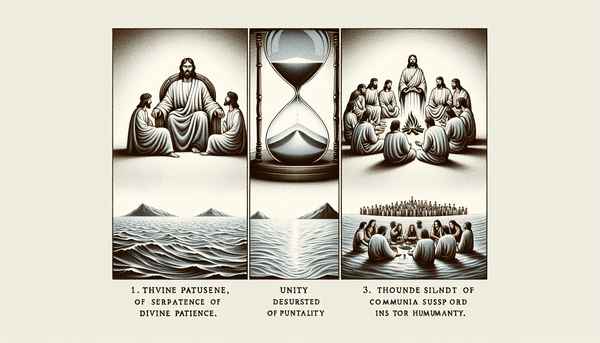God's Patience with Humanity
The narrative of Noah and the ark is a poignant example of God's patience. In Genesis 6-9, we observe God's long-suffering with a corrupt world, giving humanity time to repent before the inevitable judgment of the flood. Yet, even as the ark is a symbol of divine wrath, it also represents mercy—a vessel of salvation for those who would heed the call to righteousness. Similarly, the Israelites' journey through the wilderness is marked by God’s care despite their frequent rebellion. Through their sojourn in Exodus and Numbers, God sustained them, guiding them towards the Promised Land and maintaining the covenant. The prophets, too, embody God’s patience, as they deliver repeated calls for repentance to the nation of Israel across the Old Testament, offering warnings and prophecies to steer them back to God. In the New Testament, the ministry of Jesus Christ is the ultimate expression of divine patience; He embodies forgiveness, offering salvation to all who believe, as affirmed in 2 Peter 3:9, which reminds us that 'The Lord is not slow in keeping his promise... Instead he is patient with you, not wanting anyone to perish, but everyone to come to repentance.'
Conclusion
The patience of God, the significance of community, and the divine-human nature of Jesus stand as pillars within the biblical narrative that offer profound insights for our spiritual journey. The stories and teachings of Scripture not only provide doctrinal clarity but also guide us in navigating the complexities of life with faith and resilience. As we reflect on these themes, we are reminded of the depth of God’s love, the strength that comes from unity, and the transformative power of Jesus Christ in our lives. May this exploration encourage us to delve deeper into our own understanding of these biblical principles and to live out our faith with renewed purpose and commitment.
FAQ
Q: In what ways does God demonstrate patience with humanity throughout the Bible?
A: God shows patience with humanity in numerous ways throughout the Bible. For example, He waited 120 years for Noah to build the ark before the flood, provided countless opportunities for Israel to repent during their wilderness wanderings, sent prophets to call the people back to Himself, and ultimately, in the New Testament, offered salvation through Jesus Christ, patiently waiting for all to come to repentance (2 Peter 3:9).
Q: What biblical principles can be drawn from the story of Lasuras?
A: Although not directly from the Bible, the story of Lasuras aligns with biblical principles such as trusting in a higher power during times of crisis, the importance of community and unity in facing challenges, the power of perseverance and faith in overcoming adversity, and gratitude and stewardship for divine provision.
Q: Can you provide a summary of 2 Peter 3:9 in the New International Version (NIV) of the Bible?
A: 2 Peter 3:9 in the NIV states that 'The Lord is not slow in keeping his promise, as some understand slowness. Instead he is patient with you, not wanting anyone to perish, but everyone to come to repentance.' This verse emphasizes the Lord's patience and desire for all to achieve salvation through repentance.
Q: What does the unity of Jesus and the Father according to John 10:30 signify for Christians?
A: John 10:30, where Jesus says, 'I and the Father are one,' signifies the deep unity between Jesus and God the Father, affirming Jesus' divine nature. This verse is crucial for Christians as it supports the doctrine of the Trinity and the understanding that Jesus is fully God, an essential aspect of Christian faith.






